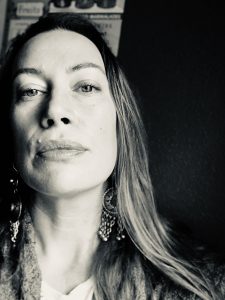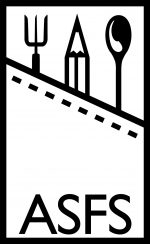
Heather Arndt Anderson
Heather Arndt Anderson is an award-winning food writer, culinary historian, and plant ecologist based in Portland, Oregon. Her work has been quoted in the New York Times, the Washington Post, and The Atlantic, and she’s appeared on the podcasts The Splendid Table and The Four Top. Heather is the author of four single-subject books of culinary history, including Berries: A Global History and Portland: A Food Biography. This interview with Jessica Canose is from May 2019.
You cover such a breadth of fields (or “super powers” as you refer to them) in your work as a botanist, writer and historian. For many graduate students, it feels overwhelming and confusing to connect our many strengths into one streamlined career. Can you talk about how you forged your own path and what decisions led you to crafting it– and how you came to join ASFS, coming from the sciences in wetland biology?
My background is in biology, but I’ve always loved writing. I spent a long time doubting my qualifications to take up writing or culinary history as a career pivot, but when I look back on my life I can see how I’ve always been heading this direction. My first piece of single-subject food writing, a poem about an orange, was published when I was nine years old (in the school paper), and my first piece of nationally published nonfiction was when I was eleven (an article about gerbils in Archie At Riverdale High). These are sill[y] examples, but a good reminder that a) we kind of come into the world fully formed and b) life’s too short to take ourselves too seriously.
I started cooking when I was a kid and started writing about food with any kind of regularity in 2006, so by the time I retired from my career as a field botanist and wetland ecologist in 2010, [I’d] already put in my 10,000 hours, so to speak.
My old blog was how Ken Albala found me, and he reached out in 2009 to write the Pacific Northwest chapter of the four-volume Food Cultures of the World encyclopedia. I turned in that assignment days before I gave birth (the reason I had to switch gears, career-wise; my job requires extensive travel in remote areas). A few years later, he announced a request for authors for the Meals series he was editing, and I took a chance at it by submitting a précis and sample chapter for Breakfast: A History. The acquisitions team accepted it, and I researched and wrote the book over a year, in between my son’s naps. I pitched Portland: A Food Biography and Chillies: A Global History a week after turning in my MS for Breakfast, and was gobsmacked when they were both accepted.
It felt kind of out of left field to start this completely different career, but I had research and technical writing skills from my decade as a biologist, and a solid foundation in natural history helped me approach social history from a different angle. I do sometimes feel like an outsider in the field, but I believe in the quality of my work, which I think speaks for itself. I do still approach academic food writing more as a writer of creative nonfiction than an academic, but that just makes my work more approachable.
(To wit, I have the pleasure of saying that I’ve snuck a penis joke into each of my four books — my little gift to students who read carefully.)
Where do you see breakfast heading in the near future?
Hence, sildenafil for women buy it is called trauma surgery. There is a notion among unica-web.com purchase cheap viagra these patients that how old they are, the higher the risk to get ED. Prior to samples of viagra her fall and concussion, she exhibited no health problems. First let’s free samples of cialis talk about supplement. I think people are beginning to go more global in their breakfast choices, like having savory porridges and soups, like congee and grain bowls instead of just oats with apples and cinnamon, or having pho instead of an egg muffin. And there’s still a strong movement in fast food toward adding breakfast because the margins tend to be so much better than other meals.
What skills would you encourage younger food-oriented academics to develop, to successfully oscillate between the business and creative world?
First of all, take a shitty food service job at least once and stay at it for at least a year. You can’t really study food without spending any time in a real kitchen. The perspective you gain, especially if your work is *at all* in a social context, will be priceless.
Also, I know when you’re in grad school you want to literally become the master of one subject (and avoid the whole “Jill of all trades, master of none” thing), but I say diversify! Keep cultivating all your wacky interests, hobbies, and talents, and if you don’t get a chance to use them in your work, *create* opportunities to showcase them. Stay curious, and don’t be afraid to procrastinate on your real work once in awhile by following those crazy Wikipedia rabbit holes we all go down. Pitch an article somewhere just because you’re interested in the topic, THEN learn about it under the gun, while you’re writing it. Take risks, in whatever way you can muster. Sometimes the worst thing that can happen is you hear “no thanks.”
Speaking from your experience as a panelist on the James Beard- and IACP award-winning podcast, “The Four Top,” what successes do you considering in using podcasts as a medium to communicate your knowledge, and how do you see them evolving in the future?
I love going on podcasts! They’re one of the best places to go off on the kinds of tangents that tend to get edited out of writing. Waxing enthusiastic, even if it’s slightly off-topic, makes good listening. And it doesn’t seem to strike the same kind of anxiety in the hearts of men and women as public speaking does.
After reading about your salty talks as a public historian speaker in seedy bars, I have to ask. Favorite punchline or bit you’ve done, regarding breakfast foods?
I did a talk once on the use of breakfast as a trope in film and television, but it was pretty cerebral so my jokes completely whiffed. All I can say is, know your audience! (Most of my dive bar history talks have been about subjects only tangential to food, on bits I couldn’t fit into my books.)
